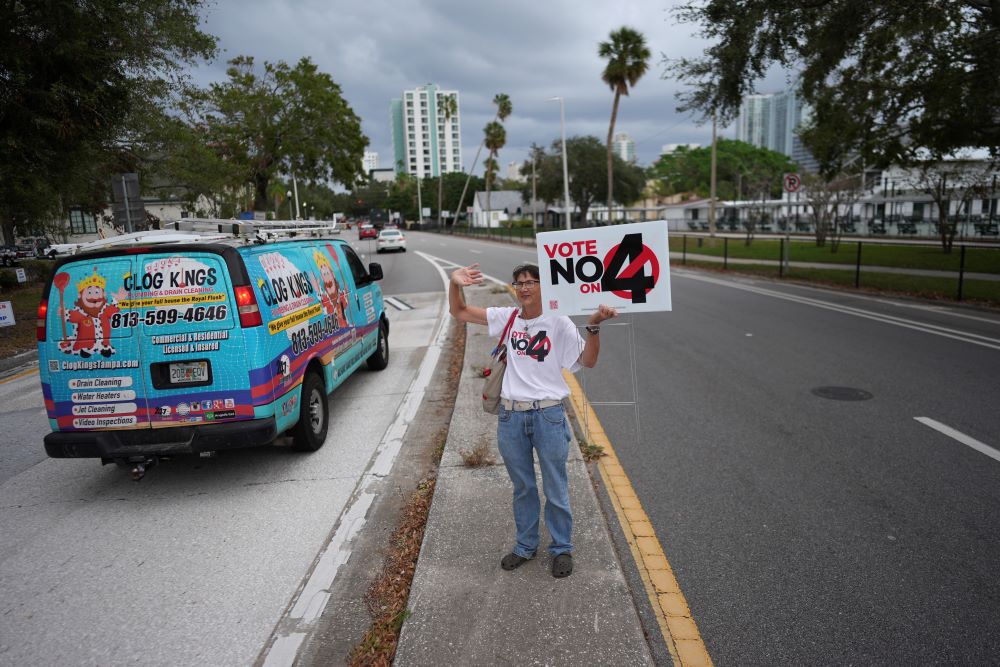
Sonja Kahkonen, an anti-abortion Catholic, holds a sign urging voters to reject Amendment 4, which would have enshrined abortion rights in Florida, on Nov. 5 outside a polling place at the Coliseum in St. Petersburg. The amendment won support from 57% of voters, but required 60% voter approval to amend the state constitution. (AP/Rebecca Blackwell)
Abortion-rights measures passed in seven states on Nov. 5. But in the three states where Catholic groups spent millions of dollars to stop such measures, voters rejected the amendments to provide greater access to abortion.
Amendments failed in Florida, Nebraska and South Dakota.
In Florida, Amendment 4 won support from 57% of voters, but the state requires 60% voter approval to amend the state constitution.
In those three states, Catholic organizations, dioceses and wealthy individuals with ties to the church funneled millions of dollars to anti-abortion initiatives, a joint investigation from the National Catholic Reporter and Mother Jones magazine found.
In Florida alone, dioceses and bishops spent more than $1.1 million to defeat the measure. The Florida Bishops' Conference donated $271,000, the Miami Archdiocese gave $384,000, and the dioceses of Venice, Palm Beach and St. Petersburg all ponied up $100,000 each to a political action committee called Florida Voters Against Extremism. National and local Knights of Columbus groups and other dioceses in the state also contributed.
In a statement on election night, the Florida Bishops' Conference said they were "profoundly relieved" at the defeat of Amendment 4, which means the state's current six-week ban on abortion will remain in effect.
"We express our gratitude to all those who worked against Amendment 4, giving of their time, talent and resources," the statement said. "Those efforts were clearly fruitful in this election and will reverberate to the good for generations to come."
In South Dakota, which has one of the strictest abortion bans in the country, Amendment G would have restored protections that existed under Roe v. Wade. The amendment failed, with nearly 59% of the electorate opposing it.
The Sioux Falls Diocese outspent abortion-rights supporters in South Dakota, with a $340,000 donation to two separate PACs fighting the ballot initiative. South Dakota will continue to ban abortion unless there is an "appropriate and reasonable medical judgment” that an abortion would save the mother's life.
Current South Dakota law makes abortion is a felony punishable by up to two years in prison. It includes no exceptions for rape or incest.
South Dakota's two bishops said in a joint statement the measure's defeat "has spared South Dakotans from experiencing the bitter fruits resulting from similar measures enacted in other states."
But Bishops Donald DeGrood of Sioux Falls and Scott Bullock of Rapid City acknowledged that a "significant number" of South Dakotans supported the measure.
"The defeat of Amendment G is certainly not the end of our state's conversation on abortion," the bishops said. "There is reason to hope it may steer that conversation in a more productive direction."
In Nebraska, there were dueling abortion measures. The initiative cementing into place the state's current 12-week ban passed with 55% of the vote; a competing amendment to codify a right to abortion failed.
In the Cornhusker State, financial support against abortion expansion came late and took a circuitous path through the coffers of some political candidates, including through two to the University of Nebraska's board of regents, the NCR and Mother Jones report found.
The billionaire Ricketts family and the conservative group CatholicVote funneled nearly $5 million to Common Sense Nebraska, which opposed the abortion-rights amendment. Some $3.9 million was donated by Marlene Ricketts, the wife of TD Ameritrade founder Joe Ricketts, while CatholicVote gave another $830,000.
Advertisement
Amendments that protected or expanded abortion access passed in Maryland, New York, Colorado, Montana, Missouri, Nevada and Arizona. At the same time, a majority of voters in at least two those states — Montana and Missouri — opted for Donald Trump. (Nevada and Arizona had not yet been called as of press time, although Trump was leading in both states.)
In New York, the newly passed Proposition 1, dubbed the "Equal Rights Amendment," attempts to create a legal framework to protect restrictions on abortion by making them an unconstitutional form of discrimination in medical care.
The New York State Catholic Conference said the amendment "could infringe on the religious liberty of institutions and individuals, and threatens the right of parents to make medical and other decisions for their children," according to a statement from executive director Dennis Poust.
In Missouri, a statement signed by the four bishops of the state said the passage of Amendment 3, which overturns Missouri's near-total abortion ban, "is not the end of our work."
"The Catholic Church in Missouri will continue to advocate for policies that uphold the dignity of all human life, protect the vulnerable, and provide support for those in need," according to the statement.
Catholics for Choice said in a statement that a "deceptive" campaign by abortion opponents, which included politicians and the Catholic hierarchy, contributed to the defeat of Florida's abortion-rights amendment.
"Amendment 4's failure to pass does not mean that most people reject legal abortion," said Stephanie Hanson-Quintana, the organizing and movement building director for Catholics for Choice. "But rather, it means that the bishops and right-wing politicians have been successful in their campaign to spend millions of dollars and instill fear and shame among the people they are supposed to serve.
“Catholics in Florida deserve so much better from their church."








